The coronavirus outbreak has caused an unprecedented health, economic and social crisis the world over and its consequences are yet to transpire. Tedros Adhanom Ghebreyesus, Director-General of WHO, in his announcement that the level of infection of the virus spreading across the globe was being raised to a pandemic said: "we are deeply concerned both by the alarming levels of spread and severity, and by the alarming levels of inaction".
It is easy to see how the task of addressing a problem of these proportions at the national level and coordinating it on a global scale is one of the most difficult challenges that a government could face. So much so that we are seeing how, in countries like Italy, and later Spain, France, the United Kingdom, Germany and the United States, measures are being approved on a daily basis to slow the advance of the coronavirus — initiatives that may well be a step behind the actual progress of the virus, translating into a long wait for the news that it is under control.
Why does the coronavirus remind us of climate change?
But doesn't this situation remind us to a large extent of another major challenge facing the planet, as in climate change? That thing called inaction that we have been hearing about for years now as the temperature of the planet continues to rise relentlessly?
Gernot Wagner, an environmental economist at New York University, was recently reflecting on how the coronavirus is behaving like climate change but on warp speed. Its sudden appearance in our society gave us no other option but to act to mitigate the coronavirus effects, rather than avoid them. Can we learn anything from all this? Can we apply any of the lessons from the coronavirus to the climate emergency?
It's amazing to see how Covid-19 is climate change on warp speed.
— Gernot Wagner (@GernotWagner) March 10, 2020
It's *not* about levels, it's about growth rates.
Yes, +1°C is bad. But it's nothing compared to +2, 3, or 4 expected by 2100.
Well, a dozen Covid cases in NYC is bad. But it's nothing compared to 1,000.
Global efforts to curb the pandemic serve as a warning to the global efforts to curb climate change. Both require decisive and early action to stop the effects of climate change, with an added dimension in the case of climate change: tackling it now—today—will bring many more benefits in the future and in all parts of the planet that will far outweigh the cost, however high that may seem to us now.
But why is it so difficult to take climate risks seriously? Politics and psychology may have some of the answers. The energy transition demanded by the economy is difficult while a fossil fuel industry continues to be financed. Besides, humans are bad at planning for a future that they don't even know for sure that they will see. As Elke Weber from the Princeton University Department of Psychology explains, "evolution has wired us to think about the here and now; we're bad at making decisions that require us to plan for the future". And yet researchers estimate that the Arctic may experience ice-free summers within 20 years or that the Amazon rainforest could become more like a savanna in only 50 years.
In this sense, yes, the way the world is reacting to tackle the coronavirus could be an exemplary lesson in tackling the fight against climate change. Precisely because it is so difficult for us to take forward-looking decisions, it is up to Governments, aided by science, to establish policies and laws to take on climate change that will mean we can stay a step ahead of its impacts.
Breathing space for the planet, the coronavirus paradox
Pollution levels have been declining as some areas of Europe and the rest of the world are brought to a standstill in an effort to contain the coronavirus pandemic. The self-isolation measures that some countries have imposed are taking a grim toll on the economy and the routine of many citizens. Ironically, these measures are allowing the planet to breathe more easily.
But what about all those economies that have reduced the levels of pollution caused by human activities in the course of the disease? Will the effort to revive the world economy after the pandemic accelerate gas emissions once more, as if nothing had ever happened? It all depends on whether Governments and superpowers like China and the United States take this opportunity to enact sustainable growth policies, or whether they choose to continue as if nothing had happened.

During the coronavirus crisis, the ever-present climate emergency
Just a few days ago, Antonio Guterres, UN Secretary-General, released the latest report published by the WMO (World Meteorological Organization), which outlines the consequences that global warming had in 2019 on people's health, marine life and a large number of the planet's ecosystems. In his presentation, the Secretary-General stated that despite the world's current concern over the coronavirus, efforts to fight climate change should not be reduced, "the coronavirus is a disease that we hope will be temporary, with temporary impacts, but climate change has been there for many years and will be there for many decades, and requires continuous action".
We find ourselves at a critical moment, when stopping the pandemic taking hold in so many of the world's nations is the most urgent task at hand. But afterward, we have to take a look back, see what is at stake, and make up for the precious time that we are wasting when it comes to containing the ever-present climate emergency.
Sources: The New York Times, Noticias ONU, The Guardian, Tiempo
Image credit:Josh Stevens / NASA Earth Observatory